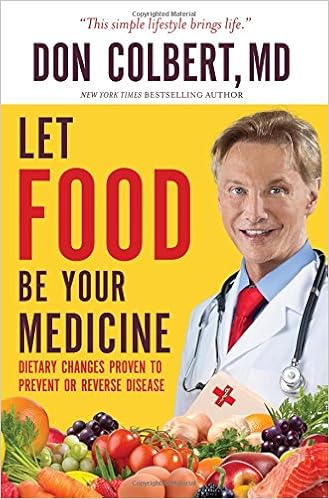If Dr. Don Colbert practiced medicine in the New York area, instead of in Orlando, FL, I’d make him my primary physician. Unlike doctors who often dash off prescriptions for drugs to “treat” chronic diseases, Dr. Colbert maintains that simple changes in our daily diet, combined with the proper dietary supplements, can help dramatically improve these long-term conditions.
 To be clear, 59-year-old Dr. Colbert isn’t against all medication. He prescribes antibiotics for patients with pneumonia, or medication to decrease the inflammation for someone with “crippling rheumatoid arthritis.” But given that 133 million Americans (45% of the population) are being treated for at least one chronic disease, Dr. Colbert asserts that “we simply cannot continue to slap a bandage on our rising health epidemic, and we must address wounds from the inside out in order to truly fix America’s underlying chronic health issues.”
To be clear, 59-year-old Dr. Colbert isn’t against all medication. He prescribes antibiotics for patients with pneumonia, or medication to decrease the inflammation for someone with “crippling rheumatoid arthritis.” But given that 133 million Americans (45% of the population) are being treated for at least one chronic disease, Dr. Colbert asserts that “we simply cannot continue to slap a bandage on our rising health epidemic, and we must address wounds from the inside out in order to truly fix America’s underlying chronic health issues.”
The New York Times best-selling author of books including What You Don’t Know May Be Killing You and The Seven Pillars of Health, Dr. Colbert’s new book, Let Food Be Your Medicine, Dietary Changes Proven To Prevent Or Reverse Disease, examines our most common health issues and offers us “a better understanding of what to eat and what not to eat,” so we will know how our choices affect issues such as cardiovascular disease, weight loss, arthritis, Type 2 diabetes, and cancer.
 “Chronic diseases continue to be responsible for seven out of every 10 deaths in the U.S. every year,” according to the press release that was tucked into my gift copy of Dr. Colbert’s new book. Medications clearly are not addressing the root of the problem. The good doctor believes he has the solution to “increase our chances for longevity by changing the foods that we eat.”
“Chronic diseases continue to be responsible for seven out of every 10 deaths in the U.S. every year,” according to the press release that was tucked into my gift copy of Dr. Colbert’s new book. Medications clearly are not addressing the root of the problem. The good doctor believes he has the solution to “increase our chances for longevity by changing the foods that we eat.”
I accepted an invitation to interview Dr. Colbert because I have become alarmed by how quick my and my friends’ doctors prescribe medications when they see spikes in blood pressure, LDL (bad cholesterol), glucose, and more.
![]()
Much of what is learned by doctors after graduation from medical school is from the pharma companies, you say in your new book. Is that why they prescribe so many meds?
Yes, that’s how they’re trained in med school and residency. When doctors do their residency rotations, they actually follow physicians around in different rotations, and see how each doctor practices. Unfortunately, most doctors practice by primarily prescribing medications. It’s a whole lot faster to do it this way, especially now that physicians have only 10 or 15 minutes to spend on each patient. While medications address the symptoms, however, they don’t get to the root of the problem, and the problem is generally much greater than the medicine can address. To address the root of the problem, you generally have to address a patient’s diet, lifestyle, thinking, emotions and everything else that involves him or her. And when you address the root of the problem, you can start to clear the disease.
How do you feel specifically about statins, the meds that are so often prescribed for to decrease the levels of “bad” cholesterol?
 Genetic switches are sometimes turned down as you age, so your liver produces more cholesterol, and statins are the most common meds prescribed for people with high cholesterol .I personally do not like them. Certain people, with certain forms of extremely high cholesterol, need statins. But for the vast majority, we can lower their cholesterol to an acceptable number with just diet and a few key supplements.
Genetic switches are sometimes turned down as you age, so your liver produces more cholesterol, and statins are the most common meds prescribed for people with high cholesterol .I personally do not like them. Certain people, with certain forms of extremely high cholesterol, need statins. But for the vast majority, we can lower their cholesterol to an acceptable number with just diet and a few key supplements.
When you look at the side effects of statin drugs, it is amazing that doctors prescribe them so often, Statins can inflame the liver, they can lead to type 2 diabetes in women and to hormone and memory problems. They can lead to dementia.
What do you prescribe for patients with high cholesterol?
We know that high cholesterol, especially oxidized cholesterol, is associated with cardiovascular disease and plaque in the arteries, but precious few doctors test for oxidized cholesterol, which is the most inflammatory cholesterol that creates the plaque in the arteries. Antioxidants can actually lower oxidized cholesterol.
LDL (“bad cholesterol”) is associated with plaque buildup, and most doctors will generally try to lower the LDL number to 70 or below, if a person has cardiovascular disease. But when we attempt to accomplish this with statins, we are, in fact, opening a patient up for other diseases, such as dementia, since cholesterol is very important for the brain. So there are a lot of questions that need to be answered. We simply don’t have all the answers.
I am seeing a lot of patients developing age-associated memory impairment, who have been on statin drugs for a year or two. So instead of working to get LDL as low as 70, I want to get it to a range of 90 to 100. I also check my patients’ oxidized cholesterol and get it as low as possible by putting them on antioxidants, such as Vitamin E and C, as well as tumeric, percumin, and glutathione boosters. These are all available in health food stores. (Note: Proper glutathione levels are required so that the other antioxidants can be properly utilized within the body. Not solely an antioxidant, glutathione also is essential in other vital biochemical functions such as energy utilization, immune system activity, detoxification and disease prevention. Poor diet, stress, medications and infections can, in fact, disrupt natural glutathione production.)
I also can decrease oxidized cholesterol tremendously by putting patients on an anti-inflammatory diet that includes low glycemic healthy fruits such as berries, extra virgin olive oil, wild salmon and fish oil.


0 Responses to “The Mistakes Most Doctors Are Making When It Comes To Chronic Illnesses”
Jill Hanson says:
I have watched him on TV programs before and have some of his books, but not this one Thanks for sharing.
Geri Brin says:
Welcome, Jill!
Donna Hart says:
Very interesting!!
Geri Brin says:
I am glad you found this interesting, Donna! So did I.
Best,
Geri
Jane says:
Have to get this book! Great post!
GeriFOF says:
Thank you, Jane. You will enjoy the book. It’s easy to read and UNDERSTAND.
Geri